The Washington Capitals were on the verge of being swept on Tuesday, August 18th, when they played the New York Islanders in Game 4 of their first-round matchup. After an abysmal start to the game that saw the Islanders jump out to an early 2-0 lead, it appeared the sweep would be inevitable.
After a timeout call from now-former Capitals’ head coach, Todd Reirden, something changed in Washington’s play. They tilted the ice in their favour and went on the attack against the Islanders, which is a position they hadn’t been in all series. They went on to dominate the rest of the game and win 3-2 to keep their season alive.
Related: Mike Gartner – Revisiting a True Hall of Fame Career
Although it was a team effort, Alex Ovechkin is the one who led the charge for the Capitals’ season-saving comeback. He scored the game-tying goal in the second period and followed that up by sniping the game-winner past Semyon Varlamov in the third period.
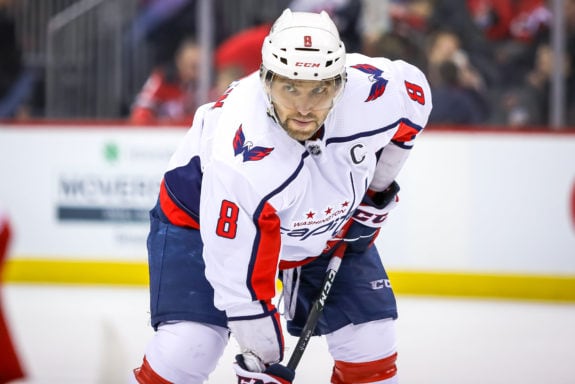
Aside from doing what Ovechkin has done since he entered the league (score goals), he was also a presence in other aspects of the game. He was physical, he was defensive, and he was emotionally invested in ensuring that his team was not sent home prematurely. Ovechkin led the team the way a captain should, and the way that all of his critics said he never could.
The Root of the Criticism
When Ovechkin entered the league, he did so with a bang. He was scoring at the same pace he always has but had a lot more energy to his game. His skill and talent naturally led to some swagger and confidence as it tends to do with young players in the NHL. This could be seen in Ovechkin’s loud and (at times) obnoxious celebrations after he scored.
Antics such as this, coupled with the fact he wasn’t too keen on playing defensively led critics to the theory that Ovechkin was a selfish hockey player.
Ovechkin’s defense has always been under scrutiny because there were videos and GIFs that would float around the internet of Ovi coasting on a back check. These small sample sizes engraved the idea into hockey fans’ heads that he doesn’t care about winning, he is just there to score goals and collect individual awards.
Another reason people believed he was selfish was because of how many shots he was taking and how many goals he was scoring. The number was so high people believed that he wasn’t passing the puck as much as he should be. This is despite the fact that in his first five seasons in the NHL, Ovechkin had 269 goals and 260 assists. Regardless of whether or not some of those assists were rebounds, you don’t accidentally get 260 assists.
It is undeniable that back in Ovechkin’s prime he was probably more focused on scoring goals than hustling on the backcheck. However, he was a young superstar in the NHL and was scoring at such an insane pace that some of his defensive woes could be forgiven, which isn’t the case for every player.
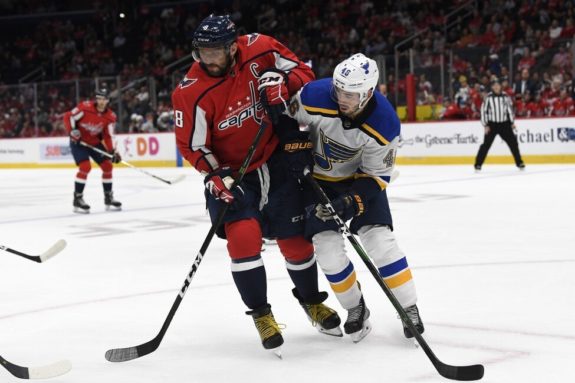
Over time, after Ovechkin was named captain of the Capitals in 2010, the narrative became that he wasn’t a good leader because he isn’t able to get his team over the postseason hump. Until 2018, the Capitals had never been out of the second round with Ovechkin on the roster. Many debated whether he should be captain of the team, while many others debated whether he should be traded.
After the Capitals finally exorcised their demons and won the Stanley Cup, people’s opinions on Ovechkin as a leader began to change. Those who believed he couldn’t be at the forefront of a championship team flipped their scripts to say that Ovechkin adapted to a system and became a “for-the-team” player.
Did he truly change? It definitely seems like he has developed his game slightly to be more complete. However, I am unsure if it is due to a complete overhaul of his mindset, or simply because his game has been forced to change as he continues to age.
Leadership by Example
Ovechkin has always led by example as long as he has been in the league from his first shift in the NHL when he threw a massive hit and damaged the stanchion. From that point on, he was a high-flying offensive and physical threat that dominated the league.
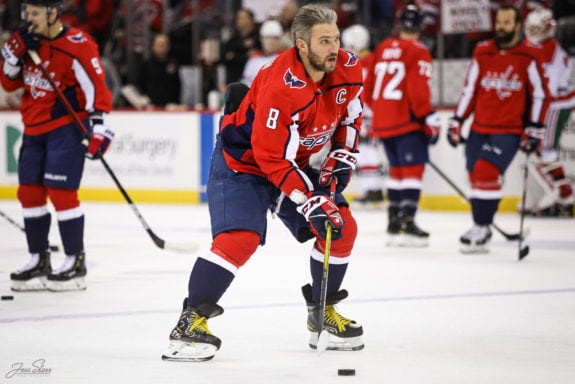
This idea that Ovechkin leads by example is something that is felt beyond the ice and throughout the organization. Ted Leonsis, the founder, majority owner, chairman and CEO of Monumental Sports & Entertainment (which owns the Capitals), said, “We have this world-class, once-in-a-generation player whose personality is becoming the personality of the team, which is: ‘I can try anything. I can do anything.'”
Ovechkin’s play has helped to provide an identity for the Capitals that other players respect and feed off of. Former teammate, Olaf Kolzig, said, “[Ovechkin] dove head first into everything we were doing. He wanted to room with a North American guy so he could learn the language and the culture quicker. I think that helped in the way he played last year because he was comfortable right out of the gate. The rest of the team fed off his energy.”
Ovechkin’s passion for the game and for winning is infectious, as it is clear to see that his love for his teammates scoring is equal to or even greater than when he scores himself. This was never on display greater than when Jakub Vrana scored in Game 5 of the Stanley Cup Final.
Everybody knows that Ovechkin scores goals at a record-setting pace, however, he is also an emotional and physical presence at all times when on the ice. If he gets pissed off, the other team will know about it whether it’s from him scoring or from him running around throwing hits. In Game 4, when Cal Clutterbuck slashed him near the end of the second period, Ovi went back at him and started a scrum to show he was invested and he was pissed off.
When you see your captain getting involved physically and emotionally the way Ovechkin does, it inspires a bench to play up to the standard he sets.
He also leads by example by scoring huge goals at huge moments. Look back at the aforementioned Game 4 against the Islanders when Ovechkin tied the game and then won it with two huge goals. Even former Capitals’ coach and current Islanders’ coach, Barry Trotz, praised Ovechkin’s game afterward when he said, “Last night, his team needed someone to lead it and he did [it] and all those elements were in play. He got two goals, he was physical, blocked a couple shots and that’s how you win.”
When The Capitals won their Stanley Cup in 2018, Ovechkin scored 15 goals in 24 games and won the Conn Smythe Trophy for being the MVP of the postseason. That is a leader stepping up and playing big games at big moments.
He has always played this way and, despite what critics say about his leadership, there is no denying that the way he plays makes him a leader for the Capitals.
The Evolution of Ovechkin
There is a reason that star players don’t remain star players for their entire careers. Eventually, the game becomes faster than they are and the way it is played changes. The difference between the good players and the great players is that they can adapt to the speed and fine-tune their game so they can continue to be elite point producers. Ovechkin is one of these players. Although I believe that Ovechkin was never truly 100% a selfish player, I think it goes without saying that his game has evolved as he has gotten older.
Related: Alex Ovechkin’s Milestones Through the Years
He is no longer attempting rushes as much as he used to when he was younger. He still was tied for fourth in the league in rush attempts with 16. However, compare that to 2008-09 when he had 36 rush attempts. This is a result of him simply not being able to rush the way he used to. He is still scoring a league-leading 48 goals, so clearly he is finding a way to put the puck in the back of the net.
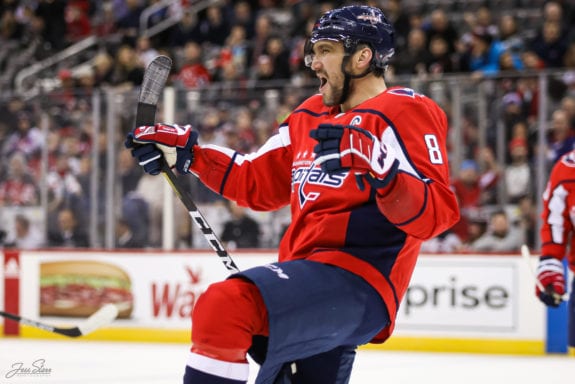
This is maybe why people began to realize how powerful Ovechkin’s one-timer is in the past five-or-so seasons. Before, he was still taking the same shots, but he was also scoring those highlight-reel goals on the rush. Now, he scores those one-times more frequently, so people took notice.
By adapting his game, he is helping his team by allowing himself to be more effective. He is not trying to rush the puck so much when he knows he can’t do it all the time. Now he is dumping the puck and chasing after it more, which also allows him to be a physical presence. He puts himself in positions to score instead of exclusively trying to create his own scoring opportunities, which he can still do with his elite shot.
Trotz had more praise for Ovechkin and the way he has grown his game as, in the same TSN article, Trotz said, “I think he’s refined his game, has a lot more detail in it than when he was younger and he loves the big moments.”
A good leader should be adapting their game the way Ovechkin has because otherwise, he is just hurting his team on a game-to-game basis. Acknowledging what he can and can no longer do and modifying his game based on these assessments is a leadership quality in itself that Ovechkin possesses.
Off-Ice Growth
As much as Ovechkin has evolved on the ice, he has also evolved a great deal off of it. One reason why this is true is that he is a father now. In August 2018, the Ovechkin family welcomed their son, Sergei, into the world. As is the case with all new fathers, there is a certain level of maturing that needs to be done.
An off-ice maturation can absolutely lead to an on-ice maturation, and I believe that is exactly what happened with Ovechkin. We all remember when he was young and driving his cars fast and punching Evgeni Malkin’s agent, but now he is a family man who understands how to be a team player because he has to be one at home all the time.
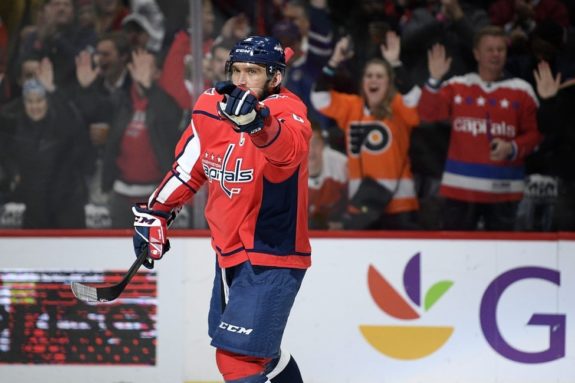
The former head coach of the Capitals, Reirden, seems to think that Ovi has matured off the ice as well. In that TSN article by Mark Masters, Reirden said, “His leadership overall has grown immensely…I can’t even define all the ways that it’s grown … That’s dealing with everything from becoming a father to taking on the role of being the leader in the room and fighting against adversity and ultimately putting that Cup over his head.”
Despite his team losing in five games in the first round, Ovechkin was the leader of this team the entire way. He tried to will his team to the second round, but it takes a village. Nobody can say he wasn’t a leader. That narrative is in the past.